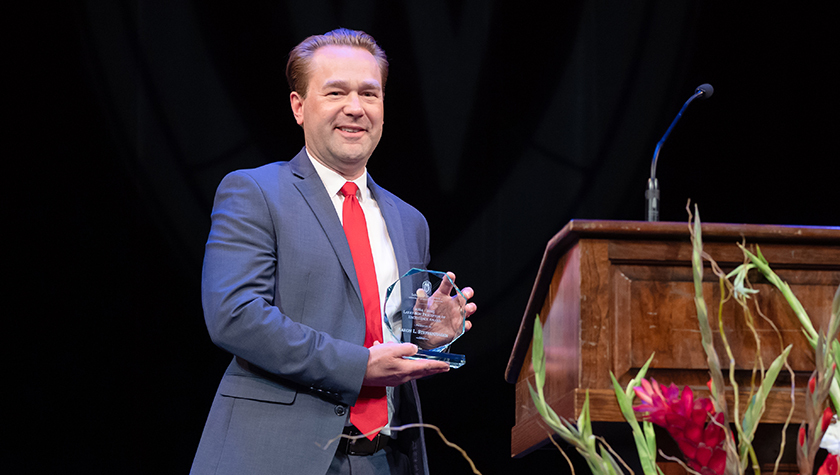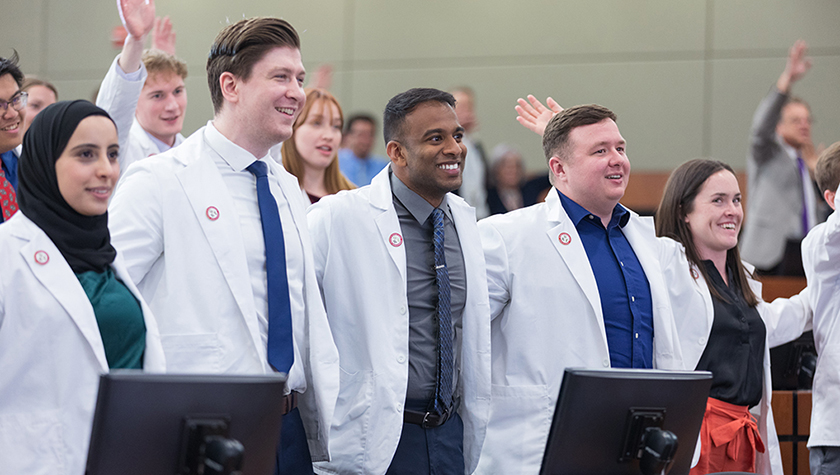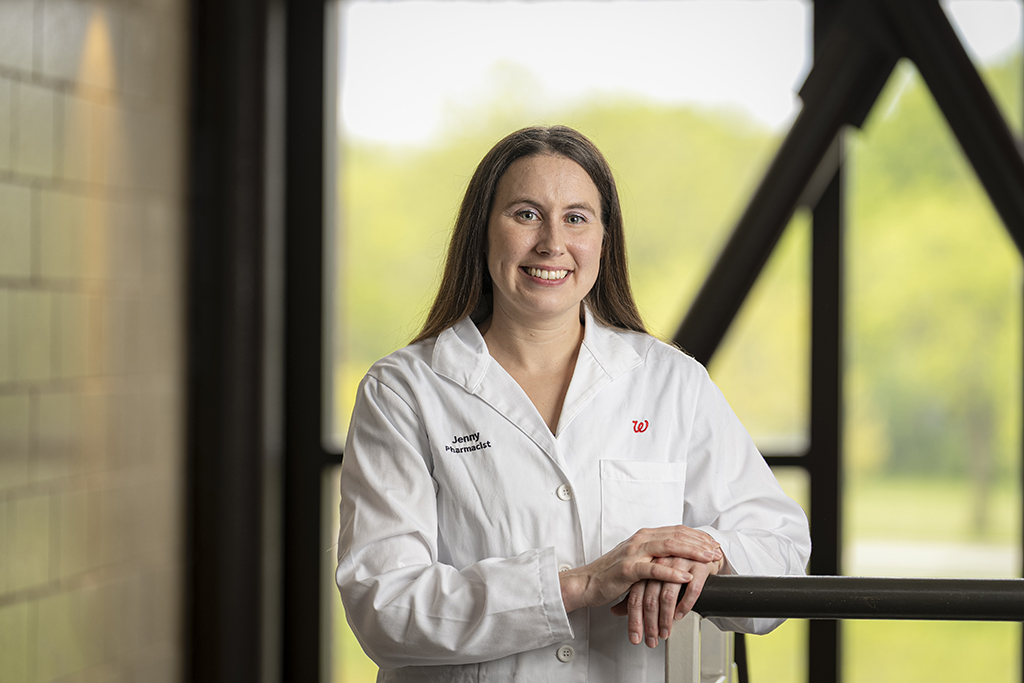
Alum Aaron Steffenhagen is honored with the School of Pharmacy’s 2025 Larry Boh Clinical Instructor Excellence Award
By Katie Ginder-Vogel
For Aaron Steffenhagen (PharmD ’01), precepting isn’t just a professional responsibility — it’s a tradition he’s proud to uphold.
Now a clinical pharmacy manager at UW Health, Steffenhagen began precepting students more than 20 years ago, inspired by mentors who helped shape his own career. This year, that full-circle moment is taking on a deeper meaning as he is honored with the University of Wisconsin–Madison School of Pharmacy’s 2025 Larry Boh Clinical Instructor Excellence Award. The award, named after a former School of Pharmacy professor, honors the School’s Advanced Pharmacy Practice Experience (APPE) preceptors who exemplify the kind of thoughtful, student-centered teaching that Steffenhagen strives to emulate.
“Larry Boh was a caring individual who gave back to the students he was involved with and impacted other students across the nation through his writing,” says Steffenhagen. “It’s an honor to receive this award, knowing how many great pharmacy preceptors are out there serving the School.”
“It’s an honor to receive this award, knowing how many great pharmacy preceptors are out there serving the School.”
—Aaron Steffenhagen
Whether guiding students through the complexities of acute care or coaching them through career decisions, Steffenhagen is committed to making their learning experience meaningful — not just in the moment, but for years to come.
Impactful precepting
In their final year of the PharmD curriculum, student pharmacists complete eight six-week rotations, during which they provide active patient care, review medication systems, teach health and wellness, engage with patients and providers, and explore pharmacy practice options — all under the supervision of a pharmacist preceptor, like Steffenhagen.
“My role is to facilitate APPE students’ next career step, whatever that may be,” Steffenhagen says. “It could be moving on to a residency, into the workforce, or other areas. I help them develop their abilities and reflect on their strengths and opportunities and how they’re going to improve upon those over the rotations and years to come.”

At UW Health, Steffenhagen oversees pharmacy practice and services across critical care, emergency medicine, neurosciences, and psychiatric care, while maintaining his own clinical practice and serving as a preceptor. Over the years, he has also led emergency and disaster preparedness efforts and helped establish pharmacy services in the emergency department during his time as a clinical pharmacist. He draws on this broad experience to guide PharmD students during their rotations. His rotation fulfills students’ required health system pharmacy rotation, offering students a dynamic view of hospital-based practice and the pharmacist’s role within interprofessional teams.
“We aim to give students a diverse experience across a wide range of practice areas and exposure to interprofessional teams, so they have a better understanding of how a health system runs, and how and where pharmacists can have an impact,” he says. “We want to ensure we achieve all requirements of the rotation, while customizing or adjusting it to what individual learners need, want, or desire, to facilitate their success in their career trajectory.”
Steffenhagen started precepting when he joined UW Health more than 20 years ago, because he knew it would provide him with increased job satisfaction.
“I valued the idea of teaching others and helping individuals improve their ability to impact patients in the future,” he says. “It’s meaningful to know that the little interactions I have with students and learners, while they may seem small initially, can be significant or largely impactful for them and their development.”
Supporting the profession
In addition to precepting for the School of Pharmacy’s students, Steffenhagen serves as a mentor through the School’s leadership-focused specialization in the PharmD program, helping student pharmacists build the skills and confidence needed to take on evolving roles in health care.
“As pharmacists take on enhanced roles with greater accountability, developing leadership skills is critical for ongoing success,” Steffenhagen says. “Serving as a mentor in the School’s leadership program allows me to stay connected with student pharmacists and to give back to the profession.”
“It’s rewarding knowing that the skills I’ve helped students develop have translated into something meaningful for their future careers.”
—Aaron Steffenhagen
Beyond the School, Steffenhagen is also engaged in national pharmacy leadership. He’s been active in the American Society of Health-System Pharmacists (ASHP) Section of Clinical Specialists and Scientists and recently served on the Council on Pharmacy Practice. In 2018, he was named an ASHP fellow — a distinction that honors excellence and sustained contributions to pharmacy practice.
What keeps Steffenhagen excited about his work is the opportunity to make a meaningful impact, both on patient outcomes and on the development of future pharmacists.
“I value the role pharmacists play on interprofessional care teams, working to improve patients’ lives,” he says. “And it’s rewarding knowing that the skills I’ve helped students develop have translated into something meaningful for their future careers.”
Over his more than 20 years at UW Health, many of the student pharmacists and residents he has mentored have gone on to become clinical pharmacists or pharmacy leaders within the organization, which is a testament to his dedication as both a preceptor and a role model.
“Through the years, I’ve worked with so many talented and dedicated individuals,” he says. “I’ve learned a great deal from them — and I try to pass those lessons on.”

